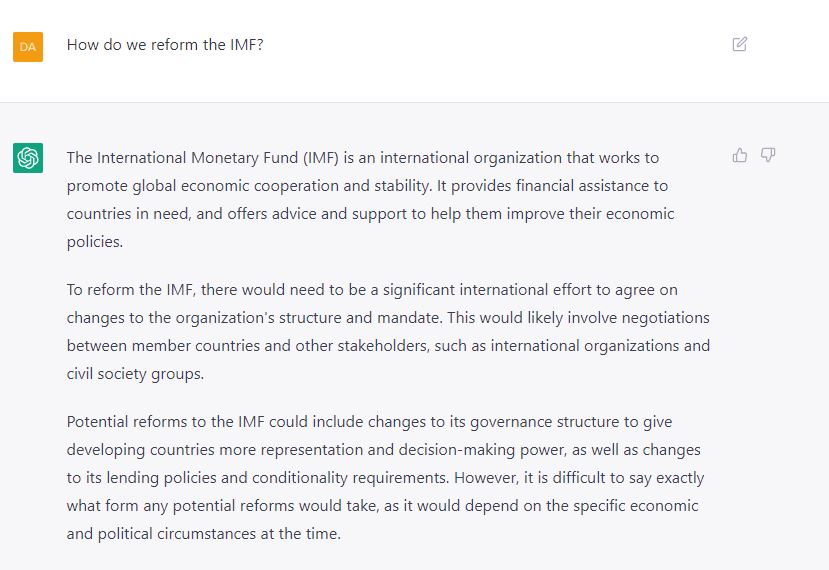The World’s Finance Chiefs are in DC for the #springmeetings2023 of the #IMF and #WorldBank.
So what happened so far? 🧵
#FundTheFuture
So what happened so far? 🧵
#FundTheFuture

SLOWDOWN:
The IMF’s latest forecasts showed that growth will slightly decline to 2.8% this year (0.1 percentage points below January projections) before rising to 3% in 2024.
Global inflation will fall from 8.7% in 2022 to 7% in 2023 and 4.9% in 2024
imf.org/en/Publication…
The IMF’s latest forecasts showed that growth will slightly decline to 2.8% this year (0.1 percentage points below January projections) before rising to 3% in 2024.
Global inflation will fall from 8.7% in 2022 to 7% in 2023 and 4.9% in 2024
imf.org/en/Publication…
PROMISES:
The @G24 which coordinates the position of developing countries called for rich countries to deliver the $100bn in SDRs that they promised in 2021 and channel them through multilateral development banks.
The @G24 which coordinates the position of developing countries called for rich countries to deliver the $100bn in SDRs that they promised in 2021 and channel them through multilateral development banks.
SEATS:
G24 called for more votes and a third Board Chair for Sub Saharan Africa at @IMFNews
And for @WorldBank to increase lending to middle income countries through better leveraging its balance sheet
But not at the expense of grants and loans to low income countries.
G24 called for more votes and a third Board Chair for Sub Saharan Africa at @IMFNews
And for @WorldBank to increase lending to middle income countries through better leveraging its balance sheet
But not at the expense of grants and loans to low income countries.
WORLD’S BANK:
120 serious figures called on the @WorldBank to implement a 10 point plan for reform of the institution.
120 serious figures called on the @WorldBank to implement a 10 point plan for reform of the institution.
https://twitter.com/david_mcnair/status/1645311059694166018?s=46&t=z7DdZ94wXMljp93FTCUCDg
DEMAND:
New data will show huge demand for IMF trusts.
Resilience and Sustainability Trust has received SDR 25.4bn (target SDR 33bn)
Poverty Reduction and Growth Trust has received SDR 9.1bn (target SDR 12.6bn)
Saudi Arabia, Ireland & Switzerland are expected to pledge.
New data will show huge demand for IMF trusts.
Resilience and Sustainability Trust has received SDR 25.4bn (target SDR 33bn)
Poverty Reduction and Growth Trust has received SDR 9.1bn (target SDR 12.6bn)
Saudi Arabia, Ireland & Switzerland are expected to pledge.
DROP THE DEBT:
The @WSJ is reporting a possible debt breakthrough with China dropping its demand that multilateral creditors take haircuts
In exchange for them committing new concessional financing to countries whose debt is being restructured.
wsj.com/articles/china…
The @WSJ is reporting a possible debt breakthrough with China dropping its demand that multilateral creditors take haircuts
In exchange for them committing new concessional financing to countries whose debt is being restructured.
wsj.com/articles/china…
POOR PAY MORE:
@UNDP has a new report that shows the full cost of credit rating idiosyncrasies in Africa.
The so called ‘African Premium’ is $74.5 billion in excess interest and foregone funding.
undp.org/sites/g/files/…
@UNDP has a new report that shows the full cost of credit rating idiosyncrasies in Africa.
The so called ‘African Premium’ is $74.5 billion in excess interest and foregone funding.
undp.org/sites/g/files/…
UPDATE: @melindagates called for a reboot of the financial system so that it works for women and the world
on.ft.com/3Uq3pce
on.ft.com/3Uq3pce
TRUST: Juan Manuel Santos of @TheElders called for a rebuilding of trust in multilateralism.
on.ft.com/3Uq3pce
on.ft.com/3Uq3pce
ERROR:
A new study suggests Christine Lagarde was maybe wrong about barriers at the @ecb to unlocking $200 billion for development via SDRs.
devex.com/news/was-lagar…
A new study suggests Christine Lagarde was maybe wrong about barriers at the @ecb to unlocking $200 billion for development via SDRs.
devex.com/news/was-lagar…
EXPLAINER:
@szmakka lays out the rationale for the 10 point plan for the @WorldBank to become the World’s Bank.
@szmakka lays out the rationale for the 10 point plan for the @WorldBank to become the World’s Bank.
https://twitter.com/devex/status/1645902542759657472
REFORM
@fatenaggad lays out the reforms that the @WorldBank needs to make.
‘The World needs change agents like never before’
african.business/2023/04/long-r…
@fatenaggad lays out the reforms that the @WorldBank needs to make.
‘The World needs change agents like never before’
african.business/2023/04/long-r…
TIGHTENING
@IMFNews fiscal monitor that nearly three-quarters of countries tightened both fiscal and monetary policies to curb inflation.
Global debt levels are rising faster than predicted, driven mainly by the U.S. and China.
imf.org/en/Publication…
@IMFNews fiscal monitor that nearly three-quarters of countries tightened both fiscal and monetary policies to curb inflation.
Global debt levels are rising faster than predicted, driven mainly by the U.S. and China.
imf.org/en/Publication…
1%
The steering committee of the World Bank and IMF—failed to release a communique.
The chair announced an additional $50bn over ten years through tweaks to the @WorldBank’s balance sheet.
$5bn a year is less than 1% of the financing need.
But serious shifts are on the table
The steering committee of the World Bank and IMF—failed to release a communique.
The chair announced an additional $50bn over ten years through tweaks to the @WorldBank’s balance sheet.
$5bn a year is less than 1% of the financing need.
But serious shifts are on the table

THE DETAIL
The committee agreed to:
👉🏿lower the Bank’s minimum equity-to-loan ratio from 20% to 19%
👉🏿a hybrid capital pilot
👉🏿a bilateral guarantee program
The committee agreed to:
👉🏿lower the Bank’s minimum equity-to-loan ratio from 20% to 19%
👉🏿a hybrid capital pilot
👉🏿a bilateral guarantee program
DOOR OPEN
They agreed to make progress on:
👉🏿Elimination of the Statutory Lending Limit
👉🏿Balance sheet optimization for IDA
👉🏿An IDA Crisis Facility
👉🏿Enhanced callable capital & hybrid capital
👉🏿SDR channeling
worldbank.org/en/news/statem…
They agreed to make progress on:
👉🏿Elimination of the Statutory Lending Limit
👉🏿Balance sheet optimization for IDA
👉🏿An IDA Crisis Facility
👉🏿Enhanced callable capital & hybrid capital
👉🏿SDR channeling
worldbank.org/en/news/statem…
EXPECTATION
G7 Finance Ministers underscored their commitment to low- and middle-income countries.
They pledged progress on
👉🏿MDBs’ evolution
👉🏿SDR channeling
👉🏿Resources for IMF Trust Funds
👉🏿Debt vulnerabilities
👉🏿Global Health &
👉🏿Climate change
consilium.europa.eu/en/press/press…
G7 Finance Ministers underscored their commitment to low- and middle-income countries.
They pledged progress on
👉🏿MDBs’ evolution
👉🏿SDR channeling
👉🏿Resources for IMF Trust Funds
👉🏿Debt vulnerabilities
👉🏿Global Health &
👉🏿Climate change
consilium.europa.eu/en/press/press…

VS REALITY
New overseas aid stats show a whopping $29.3bn never went overseas. 🤷♂️
The UK now spends more aid in the UK than outside the island.
New overseas aid stats show a whopping $29.3bn never went overseas. 🤷♂️
The UK now spends more aid in the UK than outside the island.
https://twitter.com/Sara_Harcourt/status/1646233803327778816?s=20
NO DEAL
The Global Sovereign Debt Roundtable agreed on improving information sharing and setting deadlines.
A proposal for a three-month deadline from when the IMF reaches a staff-level agreement with a debtor country was not agreed.
But… 👇🏾
The Global Sovereign Debt Roundtable agreed on improving information sharing and setting deadlines.
A proposal for a three-month deadline from when the IMF reaches a staff-level agreement with a debtor country was not agreed.
But… 👇🏾
WORK CONTINUES
On…
👉🏿comparability of treatment;
👉🏿cut-off dates;
👉🏿treatment of arrears;
👉🏿the scope of debt to be restructured (including domestic debt);
👉🏿principles on debt service suspension.
worldbank.org/en/news/statem…
On…
👉🏿comparability of treatment;
👉🏿cut-off dates;
👉🏿treatment of arrears;
👉🏿the scope of debt to be restructured (including domestic debt);
👉🏿principles on debt service suspension.
worldbank.org/en/news/statem…
SOMETHING SPECIAL
France will call on countries to channel at least 30% of their SDRs to vulnerable countries?
How?
Finance Minister Bruno Le Maire believes an SDR bond proposal is promising
France will call on countries to channel at least 30% of their SDRs to vulnerable countries?
How?
Finance Minister Bruno Le Maire believes an SDR bond proposal is promising
https://twitter.com/velvetart/status/1646172605639008263
KICK THE CAN
Overall it doesn’t feel like the rhetoric on the #polycrisis is being met with reality.
one.org/us/press/sprin…
Overall it doesn’t feel like the rhetoric on the #polycrisis is being met with reality.
one.org/us/press/sprin…

LIGHT RELIEF
If all of this seems a bit depressing here’s something (a bit) less heavy. 👇🏾
If all of this seems a bit depressing here’s something (a bit) less heavy. 👇🏾
https://twitter.com/oneaftershocks/status/1646139389834084362
• • •
Missing some Tweet in this thread? You can try to
force a refresh

 Read on Twitter
Read on Twitter




















